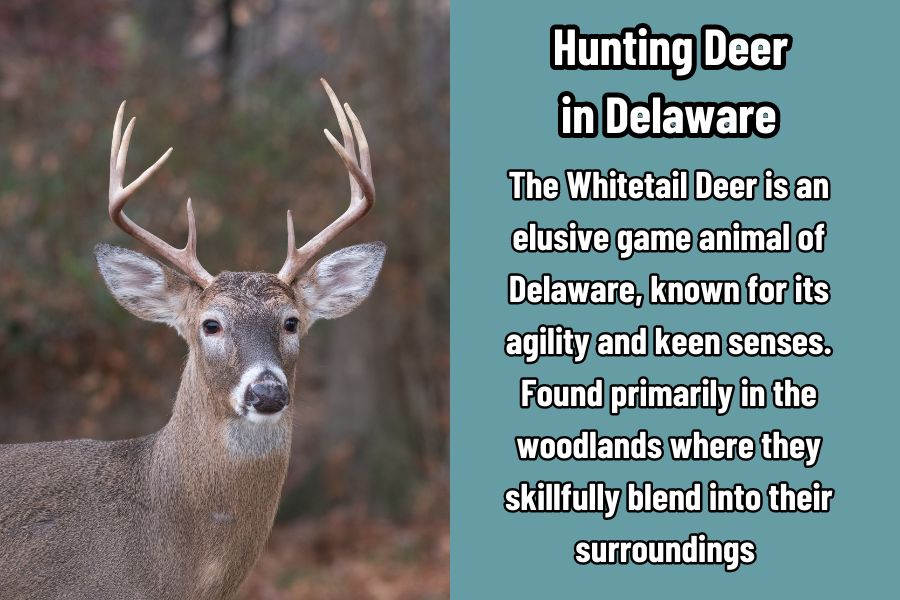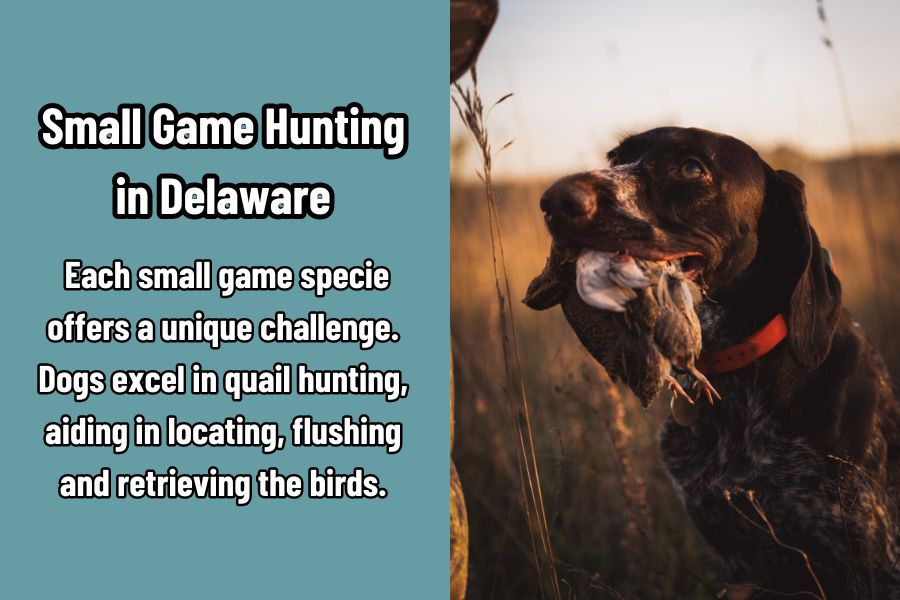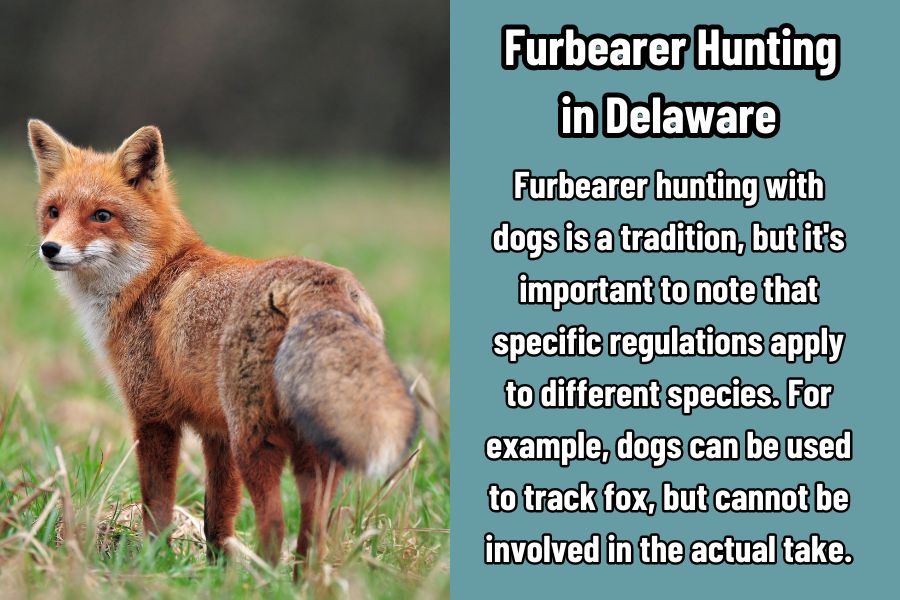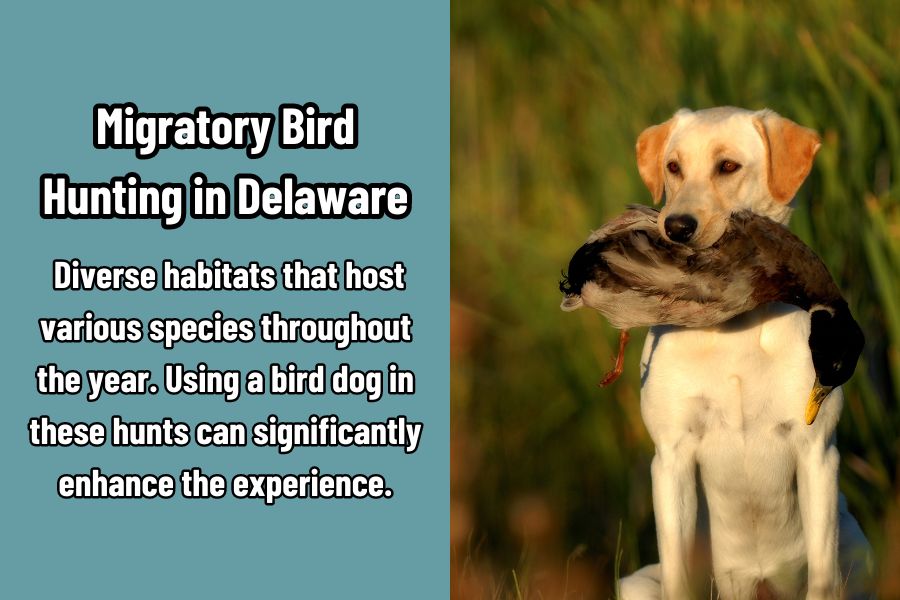Discover the ultimate guide to hunting with dogs in Delaware. Covering everything from regulations along with key insights and tips for hunting big game, small game, furbearers and migratory birds in Delaware.
Introduction
The crisp, early morning air in Delaware carries the sound of leaves crunching underfoot and the distant barks of eager canines. For many, the heart of hunting season is not just about the game; it’s about the bond between hunter and dog, a partnership honed through tradition and skill. This connection, this art of hunting with dogs in Delaware, brings together individuals who share a profound respect for nature and the disciplined collaboration of man’s best friend.
You understand the thrill, the anticipation, and the meticulous preparation that define this unique hunting experience. It’s more than a pastime—it’s a way of life that honors the legacy of the wilderness and the instincts of the best hunting dogs. Whether you’re a seasoned hunter or just beginning, every outing with your dog in Delaware is a journey filled with potential and learning.
In this comprehensive guide, we delve into the essential aspects of hunting with dogs in Delaware, from navigating legalities to the various game types. With practical advice and insider knowledge, we’ll help you be better prepared for your next hunt. So, let’s begin this journey into the heart of Delaware’s hunting culture.
Understanding Hunting with Dogs in Delaware

Navigating the hunting landscape in Delaware means understanding the important regulations that govern the use of our canine companions in the field. Let’s delve into some key specifics about what’s allowed and what’s not, ensuring every hunt with your dog is both enjoyable and compliant with Delaware hunting regulations.
Remember, your first step—get a license for your hunting dog. It’s not only a legal requirement; it’s a mark of a responsible hunter.
Hunting with Dogs in Delaware – What’s Not Allowed?
In the spirit of responsible hunting, it’s crucial to recognize the boundaries set for using dogs during specific seasons and for certain game. Here are some key points you must follow:
- Delaware law strictly prohibits the use of dogs for hunting deer across all counties.
- Dogs are not allowed when hunting wild turkey.
- The pursuit of muskrats and otters with the aid of dogs is off-limits.
- Dogs can be used to track fox but are not allowed to participate in the actual harvest of the fox.
- It’s also important to note that dogs are not allowed to roam freely from sunset to sunrise, with the exception for landowners possessing over 20 acres, who may allow their dogs to roam from October 1 through February 28 on their own land.
Hunting with Dogs in Delaware – What’s Allowed?
The joy of hunting with dogs is very much alive in Delaware. Some restrictions do exist which is why you should always verify current regulations before you hunt. Below are some key points you must understand:
- The law warmly permits the use of dogs to find, point, and retrieve upland game birds and webless migratory birds, embracing the essential role dogs play in these hunting traditions.
- Dogs can be used from an established blind or for hunting doves, quail, raccoon, and rabbit on lands where deer hunting with firearms is prohibited during the colder months of December and January.
- Additional details about “What is Allowed” are included below for each specie under sections—Small Game, Furbearers and Migratory Birds.
Training Dogs for Hunting in Delaware
Delaware cherishes its hunting heritage, acknowledging that well-trained dogs are at the heart of a successful hunt. To support this, designated Dog Training Areas have been established, offering a controlled environment for young pups to hone their hunting skills.
Training outside these areas is restricted to the open hunting seasons for the specific game targeted, or as per the guidelines set out on area maps.
For rabbit hunters, training days are allocated on Sundays during September, October, and November, excluding firearm deer season Sundays.
Detailed regulations and allowed activities are clearly outlined in the wildlife area maps, serving as a guide for all training endeavors.
Understanding and adhering to all the Delaware hunting regulations ensures that the tradition of hunting with dogs in Delaware continues in a respectful and sustainable manner.
Hunting Deer in Delaware

Deer hunting in Delaware offers a rich variety of experiences that blend tradition with the thrill of the chase. While hunting with dogs in Delaware is a celebrated practice, it’s essential to note that dogs are not permitted in deer hunting, preserving the fairness and challenge of the hunt.
Whitetail Deer
The Whitetail Deer is an elusive game animal of Delaware, known for its agility and keen senses. These deer are predominantly found in the lush woodlands and agricultural fields, where they skillfully blend into their surroundings. For those hunters, securing a Whitetail Deer license is an opportunity to experience one of the most classic hunts in North America.
Delaware’s deer hunting season spans various periods, including archery, shotgun, and muzzleloader seasons, offering hunters multiple opportunities to engage with this revered game. Intriguingly, the Whitetail Deer can exhibit a fascinating range of antler sizes, often influenced by their diet and habitat quality, adding an extra layer of excitement and unpredictability to the hunt
Sika Deer
The Sika Deer, although less common than the Whitetail, presents a unique hunting opportunity in Delaware. These smaller, elusive deer inhabit the marshy and wooded areas, providing a different hunting experience characterized by patience and stealth. Obtaining a license to hunt Sika Deer involves specific regulations, reflecting their distinct status and ensuring sustainable hunting practices.
Hunting seasons for Sika Deer align with those for Whitetail, yet the experience is distinctively different. These deer are known for their sharp barking calls, often used to communicate within the herd, adding a thrilling auditory dimension to the hunt. Sika Deer are really a small elk originally from East Asia.
While hunting with dogs in Delaware for deer is not allowed, the hunt remains a treasured experience for big game hunters.
Small Game Hunting in Delaware

Hunting with dogs in Delaware for small game is a popular and traditional method. Let’s explore the various small game species along with some key insights.
Hunting Gray Squirrel in Delaware
Gray squirrels are abundant and provide hunters with exciting opportunities, especially when assisted by dogs. These agile creatures favor the wooded areas, making the hunt a thrilling game of stealth and strategy. The hunting seasons typically run from September to February, giving ample time for hunters to engage with these crafty mammals. Using dogs in gray squirrel hunting is not a common practice, but can be very rewarding with a well trained dog that helps locate and retrieve tree squirrels.
Delmarva Fox Squirrel
The Delmarva Fox Squirrel, a larger, more elusive cousin of the common gray squirrel, is on Delaware’s Endangered Species list, making it a non-huntable species. Conservation efforts are in place to protect and monitor this rare animal, highlighting the importance of responsible wildlife management.
Hunting Cotton Tail Rabbit in Delaware
Cotton Tail Rabbit hunting is a favored tradition in Delaware, where the open fields and brushy habitats provide perfect environments for these quick and elusive animals. Hunting seasons typically extend from November to February, and using dogs is a widespread practice that adds to the excitement and effectiveness of the hunt.
Hunting Groundhogs in Delaware
Groundhog hunting is not only a sport but also a means of managing the population and minimizing agricultural damage. These creatures, often found in open fields and pastures, can be hunted throughout the year, with no specific season restrictions. While dogs are not traditionally used for groundhog hunting, they can play a role in locating and retrieving.
Hunting Ring-necked Pheasant in Delaware
The Ring-necked Pheasant, with its vibrant plumage and elusive nature, provides a colorful and challenging hunt. These birds thrive in agricultural and grassland areas, and the hunting season typically runs from November to January. Dogs are particularly useful in pheasant hunting, helping to flush and retrieve birds, making them an integral part of the hunt.
Hunting Bobwhite Quail in Delaware
Bobwhite Quail hunting is a storied tradition in Delaware, where the bird’s quick flight and tendency to hide in dense cover make it a challenging target. The ideal habitats are brushy fields and wooded edges, with the hunting season usually from November to January. Dogs excel in quail hunting by aiding in locating, flushing and retrieving the birds.
Hunting Turkey in Delaware
Turkey hunting is a popular pursuit in Delaware, offering a unique challenge due to the bird’s size, intelligence, and wariness. While small game hunting in Delaware often involves dogs, it’s important to note that using dogs to hunt wild turkeys is unlawful in the state. Hunters cannot use bait or drive turkeys, nor can they shoot them while at roost. Additionally, all first-time turkey hunters aged 13 and older must complete a mandatory turkey education course, emphasizing the importance of ethical hunting practices and knowledge.
Through the diverse landscapes of Delaware, small game hunting with dogs presents an engaging way to connect with nature and your favorite hunting dog.
Furbearer Hunting in Delaware

Delaware’s diverse ecosystems support a variety of furbearing species. While hunting with dogs in Delaware is a tradition, it’s important to understand key regulations regarding furbearer hunting in Delaware with dogs.
Hunting Muskrat in Delaware
Muskrats, found in wetlands and along waterways, are a common target in Delaware’s furbearer hunting scene. However, the state strictly prohibits the use of dogs to hunt muskrats, ensuring the hunt relies on traditional trapping methods. The muskrat trapping season typically aligns with the colder months, providing sustainable management of their populations.
Hunting Otter in Delaware
Otters, with their playful nature and aquatic habitats, are also protected from being hunted with dogs in Delaware. These skilled swimmers are often found along rivers and streams, and their hunting is regulated to maintain ecological balance. Otter hunting is closely monitored, with specific seasons and tagging requirements to support conservation efforts.
Hunting Mink in Delaware
Mink, small but fierce predators, inhabit Delaware’s waterways. While not specifically mentioned in dog hunting regulations, mink hunting typically involves stealth and precision, with trapping being the preferred method. Mink are prized for their fur, and the hunting season is regulated to ensure their sustainable harvest.
Hunting Raccoon in Delaware
Raccoon hunting is a popular activity in Delaware, often conducted at night. Dogs are commonly used in raccoon hunting, with their keen senses aiding in tracking these nocturnal creatures. The season for raccoon hunting is usually long, spanning from September to March, allowing for ample hunting opportunities.
Hunting Opossum in Delaware
Opossum hunting in Delaware is an activity where dogs can be used to track and tree these nocturnal animals. Known for their unique defense mechanism of playing dead, opossums provide an interesting hunting experience. The season typically runs concurrently with that of raccoon hunting.
Hunting Beaver in Delaware
Beaver hunting in Delaware mainly involves trapping due to their aquatic nature and the challenges of hunting them with dogs. Beavers, known for their dam-building, can impact water flow and ecosystems, making their management crucial. Hunting and trapping seasons are established to control their population and mitigate environmental impacts.
Hunting Nutria in Delaware
Nutria, invasive rodents that pose significant ecological threats to wetland habitats, can be hunted in Delaware. While the use of dogs is not typically mentioned, the focus is on controlling their population to protect native vegetation and prevent land erosion. Hunting and trapping efforts are encouraged to manage their numbers effectively.
Hunting Red Fox in Delaware
Red fox hunting in Delaware comes with specific restrictions: it is illegal to kill a red fox that is being pursued by dogs, and hunting with the aid of light is also prohibited. Dogs can be used to track, but the actual take must be without the dog’s direct involvement. This ensures a fair chase and respects the cunning nature of the fox.
Hunting Coyote in Delaware
Coyote hunting has become increasingly significant in Delaware due to their growing population and the challenges they present to wildlife management. Dogs can be used to hunt coyotes, making this a dynamic and challenging pursuit. Coyote hunting is often unrestricted by season, allowing year-round opportunities to manage their impact on local ecosystems.
Hunting with dogs in Delaware for furbearers presents unique challenges. Hunters must navigate the rules to enjoy the rich tradition of hunting and managing the livelihood of these species.
Migratory Bird Hunting in Delaware

Delaware is a haven for migratory bird hunting, with diverse habitats hosting various species throughout the year. Hunting with dogs in Delaware for waterfowl is not only allowed but often essential. Using a bird dog can significantly enhance the experience, providing hunters with invaluable assistance in locating and retrieving game.
Hunting Anatidae (ducks, geese including brant and swans)
In the world of waterfowl, Delaware is a hotspot for ducks, geese, brant, and swans, attracting hunters with its rich wetland ecosystems. Species like the Mallard, Canvasback, and the Snow Goose are common targets. Hunting these birds is a cherished tradition, deeply rooted in Delaware’s hunting culture, and is typically conducted from blinds or by decoying in marshy areas.
Duck species vary in habitat preference, ranging from freshwater marshes to coastal bays. Geese and brant, often found in large flocks, provide challenging and rewarding hunting experiences, especially during the colder months. Swan hunting, though more regulated due to conservation concerns, offers a unique opportunity for those drawn to the grace and challenge of these large birds.
Hunting Columbidae (doves and pigeons)
Dove and pigeon hunting is a popular activity in Delaware, with Mourning Doves being the most common quarry. These birds are known for their acrobatic flight patterns, challenging even the most skilled hunters. The open seasons for doves align with their migratory patterns, typically starting in early September. Hunting pigeons, though less common, provides a similar sporting experience, with no specific migratory restrictions.
Hunting Gruidae (cranes)
It is important to note that cranes are protected in Delaware, and hunting them is illegal. These majestic birds, with their impressive wingspans and distinctive calls, are admired rather than hunted, emphasizing the state’s commitment to conservation.
Hunting Rallidae (rails, coots and gallinules)
Rails, coots, and gallinules are hunted in the marshy areas of Delaware, where they are most commonly found. These birds provide an interesting hunting experience, often requiring stealth and patience. Rails are particularly elusive, favoring dense marsh vegetation, while coots and gallinules are more commonly seen on open waters.
Hunting Scolopacidae (woodcock and snipe)
Woodcock and snipe hunting is a revered tradition in Delaware, offering a challenging pursuit through the state’s fields and wetlands. The erratic flight patterns of these birds make them particularly challenging targets. Hunting seasons for woodcock and snipe are determined based on their migratory patterns, providing hunters with a limited but eagerly anticipated window of opportunity each year.
Hunting Corvidae (Crow)
Crow hunting in Delaware is an activity that tests both skill and strategy, with open seasons typically allowing for year-round hunting. Crows, known for their intelligence and adaptability, can be challenging to hunt, making them an intriguing target for those looking to test their prowess.
Migratory bird hunting in Delaware encompasses a range of species and environments, from the serene wetlands to the bustling fields. Each hunt presents a unique experience, enriched by the state’s diverse avian life and the companionship of a skilled hunting dog.
Delaware Hunter Education Courses and Key License Information

Basic Hunter Education Course
In Delaware, the foundation of a hunter’s journey begins with the Basic Hunter Education Course. This mandatory course is a rite of passage for anyone born after January 1, 1967, aiming to secure a hunting license. The curriculum covers a wide range of topics, from safety and ethics to wildlife management, preparing hunters for responsible participation in the sport. Classes are offered year-round across the state, providing flexibility and accessibility to all aspiring hunters.
Mandatory Dog Hunting License
For hunters who hunt with dogs, Delaware mandates a separate license for each hunting dog. This requirement underscores the importance of acknowledging the role and rules of hunting in Delaware with dogs. Securing a dog hunting license is straightforward and integral to the legal and ethical hunting practice in the state.
H.I.P. is the Harvest Information Program
Migratory bird hunting in Delaware, encompassing species like ducks, geese, swans, and more, requires adherence to the Harvest Information Program (H.I.P.). This federal initiative, essential for the management and conservation of migratory bird populations, mandates hunters to obtain a H.I.P. number annually. The process involves providing hunting activity and success data from the previous year, aiding in wildlife research and management efforts. While the H.I.P. permit is free, it’s crucial for hunters to record their H.I.P. number on their hunting license, streamlining compliance and data collection.
Wild Turkey Hunter Education Course
Turkey hunting, with its unique challenges and regulations, necessitates specialized education in Delaware. Hunters aged 13 and older must complete a state-approved turkey hunter education course before they can legally pursue turkeys. This course dives into the specifics of turkey hunting, from strategies and safety to the ethical considerations unique to this game bird.
Delaware Master Hunter Course
For the seasoned hunter who lives and breathes the hunting lifestyle, the Delaware Master Hunter Course/Certification is the next frontier. This advanced program is designed for those committed to the principles of ethical hunting, including fair chase and responsible stewardship of wildlife resources. Become a Delaware Master Hunter, you’ll be part of a very select group, certified and recognized by the State of Delaware. You’ll always be updated with the latest hunting news about, trends, tactics, skills and regulations.
Hunter education in Delaware and licensing requirements are pillars of a robust and sustainable hunting culture. Following these guidelines ensure that every hunter that hunts with or without dogs, whether novice or seasoned, is well-prepared and legally compliant.
Wrapping Up the Hunt
As we close this journey of hunting with dogs in Delaware, it’s clear that the state offers a broad range of dog-assisted hunting opportunities.
You might be sitting there, dog at your feet, thinking about the crisp mornings and the adrenaline of the chase. We get it, the call of the wild is strong, and the bond with your hunting companion is unbreakable. It’s not just about the hunt; it’s about continuing a legacy, respecting the land, and sharing in the camaraderie that defines the hunting community.
So, dust off your gear, review what we’ve learned, and start planning your next hunting trip in Delaware. With the knowledge from this guide, you’re more than ready, now go create your own memories.
FAQs – Hunting with Dogs in Delaware
Do you need to purchase a license for your dog to hunt in Delaware?
Hunting with Dogs in Delaware Answer:
Yes, in Delaware, a hunting license for your dog is mandatory to participate in dog-assisted hunting in Delaware. This requirement ensures that all hunting activities are regulated and that the dogs are recognized as hunting companions. Licenses can be acquired from the Delaware Division of Fish and Wildlife or through their online portal, providing a streamlined process for hunters and their canine partners to be properly documented and ready for the hunting season.
Can you hunt furbearer with dogs in Delaware?
Hunting with Dogs in Delaware Answer:
Yes, hunting furbearers with dogs in Delaware is generally permitted, with certain exceptions. For example, using dogs to hunt muskrats and otters is prohibited, reflecting the state’s specific wildlife management practices. For species like raccoon, fox, and opossum, however, dog-assisted hunting is not only allowed but is a well-established tradition, enabling hunters to utilize the natural abilities of their dogs to track and tree these animals.
Can You Hunt Deer in Delaware with Dogs?
Hunting with Dogs in Delaware Answer:
No, in Delaware, it is explicitly prohibited to use dogs for deer hunting. This regulation is in place to ensure ethical hunting practices and to maintain the fairness of the hunt. Dogs cannot be used in any part of deer hunting activities, from tracking to retrieval.
Can You Hunt Small Game in Delaware with Dogs?
Hunting with Dogs in Delaware Answer:
Yes, hunting small game with dogs in Delaware is a popular and lawful activity. Dogs play a vital role in hunting species such as rabbits and pheasants, where their skills in tracking, pointing, and retrieving greatly enhance the hunting experience. While there are no broad exceptions, hunters should always check specific area regulations as there might be local restrictions or guidelines in place.
Can You Hunt Migratory Birds in Delaware with Dogs?
Hunting with Dogs in Delaware Answer:
Yes, using dogs to hunt migratory birds in Delaware is allowed and forms an integral part of the hunting experience. Dogs are invaluable in retrieving downed birds from difficult terrains such as water or thick underbrush. This practice is common in hunting waterfowl, doves, and other migratory bird species. However, hunters should be aware of specific rules during certain seasons or in certain areas to ensure compliance with both state and federal regulations.
Can you hunt raccoon at night in Delaware with dogs?
Hunting with Dogs in Delaware Answer:
Yes, night hunting for raccoons with dogs in Delaware is a long-standing tradition and is legally permitted. Dogs are used to track and tree raccoons, adding to the challenge and excitement of the hunt. However, during certain periods, there might be restrictions such as ‘chase only’ nights, where raccoons can be pursued and treed by dogs but not harvested. This regulation ensures a balance between hunting for sport and wildlife conservation, allowing raccoons to be chased for training purposes without being taken.
Resources: Hunting with Dogs in Delaware
“SPECIAL NOTE: The regulations, license information, best practices, species, and other key information provided in this post are based on research using the Resources listed below. The information provided is subject to change without notice. Therefore all hunters should always verify current information published by the Delaware Department of Natural Resources and Environmental Control”.
- eRegulations – 2023-24 Delaware Hunting
- eRegulations – 2023-2024 Delaware Hunting and Trapping
- eRegulations – General Hunting Information
- eRegulations – Delaware Deer Hunting
- eRegulations – Delaware Deer Seasons
- eRegulations – Delaware Turkey Hunting
- eRegulations – Delaware Small Game Hunting
- eRegulations – Delaware Furbearer Trapping & Hunting
- eRegulations – Delaware Migratory Bird Hunting
- eRegulations – Delaware Migratory Bird Seasons & Bag Limits
- eCFR – Delaware Part 20-Migratory Bird Hunting
- eRegulations – Delaware Youth Hunting Information
- eRegulations – Delaware Public Lands Hunting & Trapping
- DCO – Delaware Conservation Game, Wildlife and Dogs
- DNREC – [Delaware Master Hunter Program]
Start planning your trip to go hunting with dogs in Delaware. Also check out our other posts about hunting with dogs in…
Alabama
Alaska
Arizona
Arkansas
California
Colorado
Connecticut


